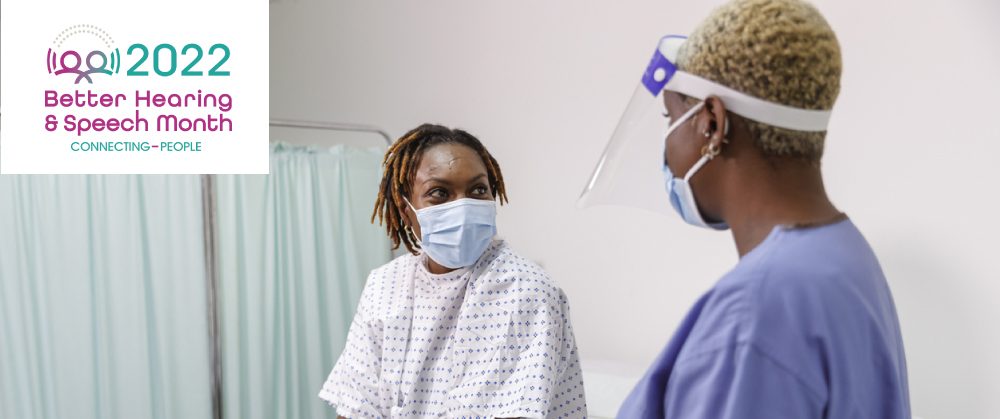Welcome to the second week of Better Hearing and Speech Month (BHSM)! As ASHA celebrates the 50th anniversary of this month-long awareness campaign, we’re highlighting recent articles that can help audiologists and speech-language pathologists (SLPs) in hospitals.
Last year alone, more than 33 million Americans were admitted to a hospital. Audiologists and SLPs in hospitals help patients better communicate their needs to staff as well as communicate with their loved ones. The articles below showcase the latest research for audiologists and SLPs in inpatient settings.
Services in Hospitals and Residential Facilities
The Effectiveness of Physical, Occupational, and Speech Therapy in the Treatment of Patients With COVID-19 in the Inpatient Rehabilitation Setting: Speech therapy can play an important role alongside occupational and physical therapy in helping patients admitted to the hospital with COVID-19. This study found that patients receiving all three types of therapy had greater mobility, self-care, and cognitive performance.
Tutorial on Clinical Practice for Use of the Fiberoptic Endoscopic Evaluation of Swallowing (FEES) Procedure With Adult Populations: Part 1: In this article, the authors provide the first updated best practice guidelines on FEES in 18 years. This tutorial can help clinicians and students evaluate swallowing with the highest standards of care.
Bimodal Fitting and Bilateral Cochlear Implants in Children With Significant Residual Hearing: The Impact of Asymmetry in Spatial Release of Masking on Localization: Some children who experience hearing loss present with significant residual hearing, leaving audiologists with options when recommending cochlear implantation. These authors studied the hearing abilities of children with bilateral and bimodal cochlear implantation, and their results can help audiologists recommend a cochlear implementation style.
The Effectiveness of Verbal–Gestural Treatment on Verb Naming in Acute Inpatient Rehabilitation: The authors of this article found that verbal–gestural treatment can help patients with acute aphasia in a hospital environment. All of the patients in the study demonstrated improvements in verbal expression.
A Nationwide Study Examining Deafness Among Hospitalized Adults: Nonspeaking deaf patients in hospitals have higher mortality rates and longer hospital stays compared with the general population. The authors emphasize that ASHA members can improve outcomes for deaf individuals by educating others and by helping design thoughtful and strategic interventions.
Positive Changes in Certified Nursing Assistants’ Communication Behaviors With People With Dementia: Feasibility of a Coaching Strategy: Speech-language pathologists can act as coaches to support positive communication for people with dementia. In this study, a 6-week coaching strategy in a hospital led to higher perceived knowledge and efficacy in certified nursing assistants and fewer negative responsive behaviors from people with dementia.
Helping You Support Your Community
According to ASHA’s most recent membership survey, 23% of ASHA members are employed in hospitals or residential health care facilities. We hope that this week’s focus can help draw attention to the important services these members provide every day for the millions of Americans admitted to hospitals every year.
Be sure to check out even more information on ASHA members in inpatient settings by visiting the BHSM home page. We’ll see you next week—when we showcase some of the latest research for ASHA members working in outpatient settings!







